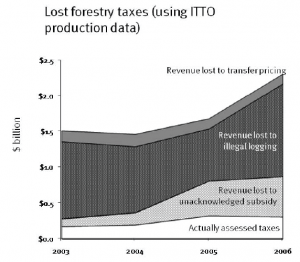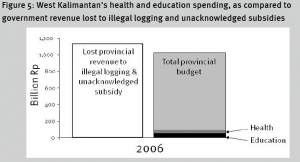Human Rights Watch has just released the report: Wild Money: The human rights consequences of illegal logging and corruption in Indonesia’s forestry sector.
Talking to allies in Riau, Sumatra, where Asia Pulp and Paper (APP) is logging tropical forests, it is clear that APP engages in corruption and utilizes a complete lack of transparency to profit at the sake of forests and local communities. But hard facts are incredibly hard to pin down on this kind of illegal activity; indeed, one of the main points of ‘Wild Money’ is that there is a complete lack of information pertaining to Indonesia’s forestry sector – it appears that not even Indonesia’s Department of Forestry has any clear idea of how much forest is being destroyed or how much money is being made.
The report complies financial data to make a conservative estimate of $2 Billion USD of lost revenue annually from timber companies evading taxes, receiving under-the-table subsidies, and logging without the proper permits.
To put this number in perspective, the report states that the World Bank has estimated with $2 Billion, Indonesia could provide health care to 100 million of its poor for almost 2 years.
‘Wild Money’ points to a historic case prosecuted by Indonesia’s Corruption Eradication Commission (KPK by its Indonesian abbreviation) in Indonesian Borneo’s West Kalimantan Province as an example of the worst of Indonesian forestry. In 2006, the KPK revealed their long running investigation into a illegal logging ring, and arrested the heads of the provincial police and forestry departments, as well as some high ranking military brass. Increadibly, the annual revenue from the illegal logs was estimated to be greater than that of the entire yearly budget of the province:
One informant who had been following the operation for its duration estimated that the actual value of the illegal logs was closer to seven times the province’s budget, or about $3 Billion USD.
Taking great risks to personal security, many of the sources and one of the authors of ‘Wild Money’ remain anonymous. Most likely, it is because of these very real threats , that the report chooses to not name the corporations, such as Asia Pulp and Paper (APP) or their competitor APRIL, who are driving this system of corruption.
It is painfully clear that Indonesia’s forestry sector needs immediate and deep reform, and that until investors, buyers, and the public puts pressure on the Indonesian Government, individuals and corporations will continue to destroy Indonesia’s rainforests at the expense of the Indonesian people and the environment.
‘Wild Money’ also addresses issues of human rights abuses and carbon trading in this report, more to come on Understory about those key issues.
David Gilbert is a Research Fellow at RAN. He has worked in the tropical forests of the Amazon and Indonesia, with a special focus on forest conservation and indigenous rights. He can be reached at davidgilbert@ran.org

